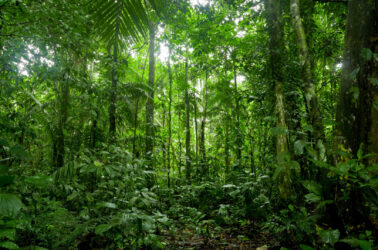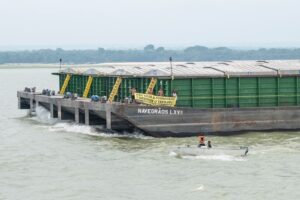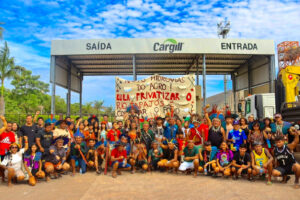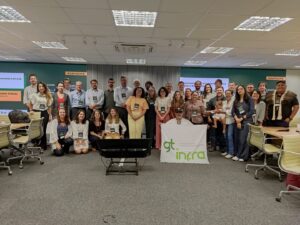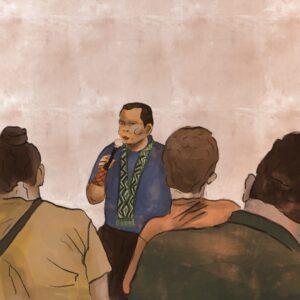“We are against projects that kill us, kill our rivers and our forest. These big projects are not infrastructure for us, we need small projects that strengthen us (…) The main infrastructure in the Amazon is the standing forest.”
Maura Arapiun, secretary of the Tapajós Arapiuns Indigenous Council
The civil society organizations connected to the Infrastructure Working Group (GT Infraestrutura) and allied networks met in Alter do Chão (Pará State) from July 4th to 6th, 2022, with significant participation of organizations and social movements in the region. Together we listened to reports, sought answers and proposed strategies and concrete actions that face old and new challenges in the region. As a result, we have prepared this document aimed at Brazilian society with a view to contributing to the debates of the electoral process, as well as the construction and implementation of public policies from 2023 onwards.
In recent decades, large infrastructure projects – such as the opening and paving of highways, industrial waterways and transhipment port facilities, railways and hydroelectric dams – have been among the main drivers of deforestation and socio-environmental conflicts in the Brazilian Amazon. The situation worsened under the Bolsonaro government, which promoted a series of setbacks in the rights of indigenous peoples and traditional communities, incentives to land grabbing on public lands and exploitation of protected areas, as well as the scrapping of public institutions. The brutal deaths of the indigenist Bruno Pereira and journalist Dom Phillips are far from being an isolated case; rather they are part of a policy of silencing social leaders subjected to profound violations of the most basic human rights.
Brazil can help the planet to mitigate the effects of the climate crisis. For this, we need infrastructure FOR the Amazon and not just IN the Amazon. We must fundamentally consider the respect and promotion of socio-productive arrangements capable of coexisting with the forest and guaranteeing access to basic rights such as health, education, energy and sanitation. GT Infrastructure is clear that the forest is the main infrastructure of the Amazon . In our most recent publication, led by Ricardo Abramovay, it is proposed that four dimensions are necessary to rethink the subject of infrastructure: nature, care, services and collective organization. It is on this basis that we present proposals for concrete actions to care for the environment and people, promoting an agenda of fair, participatory and inclusive development, based on watersheds of knowledge of which traditional peoples and communities are guardians.
Our proposals:
- Resume command and control actions in the Amazon, ending a culture where what is “illegal” becomes “legal”. Urgently restructure public institutions responsible for combating the economy of destruction, which consumes rivers and forests, violates human rights and deepens social inequality.
- Ensure the application of policies to protect forest and human rights defenders, mitigating risks, so that these people can continue their struggles together with indigenous peoples, quilombolas, extractivists and riverine people. Strengthen the Vida Por Um Fio: Self-protection of Threatened Communities and Leaders campaign and also the protection network, nationally and in each state.
- Discuss a new transportation logistics model for the Amazon, rethinking priorities and institutionalizing a decision-making process that results in good planning practices, including the evaluation of alternatives, broad participation of society at all stages and meeting the demands of promoting the supply chains of products based on social and biological diversity.
- Revise, in a transparent manner, the freight transport logistics infrastructure projects currently included in the public-private Investment Partnership Program (PPI).
- Strengthen public policies for planning and environmental licensing of infrastructure projects, with the objective of allowing better choices that maximize benefits for society and that avoid the repetition of disasters and violations of rights.
- Involve Amazon beneficiaries in the development of distributed energy models for a fair and inclusive energy transition, ensuring clean, quality energy for all and anticipating the federal government’s universalization goals, providing energy conditions for local sustainable development.
- Adopt effective policies to encourage the increase of distributed mini and micro generation in the Amazon region, as a contribution to the national electricity matrix and as a basis for a truly fair and popular energy transition.
- Demand a moratorium on new large energy projects in the Amazon until the National Energy Plan is reviewed in light of the country’s climate commitments.
- Consider urban development as a fundamental process for sustainability and human well-being in the Amazon, with infrastructure appropriate to local contexts. Cities and human settlements must be protagonists in the implementation of socio-environmental conservation measures, promotion of sociocultural diversity and mitigation and adaptation to climate change.
- Adopt measures to protect rivers, vital elements for the maintenance of life and diversity in the Amazon environment. Support the monitoring of actions related to anthropogenic stress imposed on rivers, as well as those that support the maintenance of water resources and the integrity of river systems.
- Respect the right of indigenous peoples and other traditional populations to free, prior and informed consultation and consent, strengthening governance policies.
- Structure an integrated plan to combat mining in indigenous lands, in order to enforce the constitutional prohibition of this activity in these territories. Recognize that mining is not a vector of development in the Amazon and that it needs to be substituted in favor of other economic activities, capable of coexisting with the forest and rivers, ensuring rights and reducing social inequality.
- Promote and improve social control throughout the entire cycle of planning and licensing infrastructure, including a closer relationship between civil society organizations and representatives of peoples with tribunals that monitor public accounting.
- Ensure the transparency of decision-making processes and access to comprehensive, accessible and real-time information on specific policies, plans and projects, promoting integrity and the fight against corruption in entities, public bodies and companies in the infrastructure sector.
- Ensure accountability of financial institutions and companies so that they have the obligation to assume commitments and robust mechanisms regarding human rights, environmental protection and the construction of a sustainable economy.
- Encourage economic activities that prioritize people and the maintenance of the forest and rivers. Use BNDES and other resources to support small producers in a economy based on social and biological diversity.
In general, resume and strengthen successful initiatives in public policies, ensuring transparency and effective participation at the federal, state and municipal levels, and valuing socio-environmental diversity, traditional wisdom and the leading role of Amazonian communities. The continuation of the Amazon and its peoples is urgent and possible!

